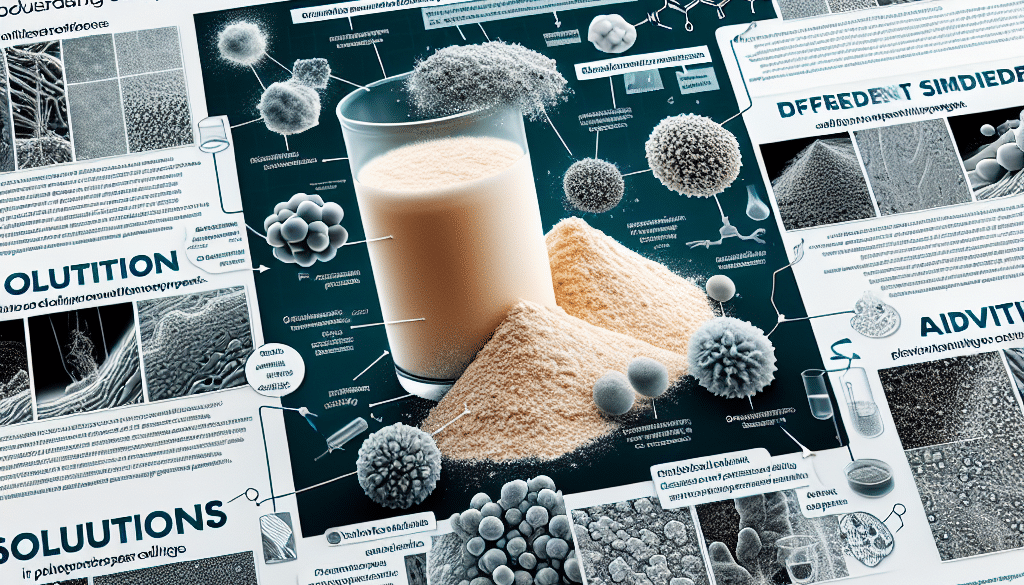Solubility Challenges in Protein Powders: Solutions Explored
-
Table of Contents
- Solubility Challenges in Protein Powders: Effective Solutions Explored
- Understanding Protein Powder Solubility
- Factors Affecting Protein Powder Solubility
- Challenges in Protein Powder Solubility
- Solutions to Enhance Protein Powder Solubility
- Advanced Processing Techniques
- Formulation Adjustments
- Encapsulation Technologies
- Case Studies and Examples
- Statistics and Market Trends
- Conclusion: Key Takeaways for Improved Solubility
- Discover ETprotein’s High-Quality Protein Solutions
Solubility Challenges in Protein Powders: Effective Solutions Explored

Protein powders have become a staple in the diets of athletes, bodybuilders, and health-conscious individuals seeking to increase their protein intake. However, one of the most common issues consumers face with protein powders is solubility. Poor solubility can lead to clumping, unpleasant texture, and difficulty in mixing, which can deter users from consuming these otherwise beneficial supplements. This article delves into the solubility challenges of protein powders and explores the solutions that manufacturers are implementing to overcome these hurdles.
Understanding Protein Powder Solubility
Protein solubility refers to the ability of protein particles to dissolve or disperse in a solvent, typically water or milk, without forming clumps. The solubility of protein powders is influenced by various factors, including the source of the protein, the processing methods used, and the presence of additives or excipients.
Factors Affecting Protein Powder Solubility
- Protein Source: Different protein sources have varying solubility profiles. For instance, whey protein is known for its excellent solubility, while plant-based proteins like pea or rice protein may present more challenges.
- Processing Methods: The way protein is extracted, purified, and dried can significantly impact its solubility. Techniques such as microfiltration and spray drying are commonly used to enhance solubility.
- pH Levels: The pH level at which a protein is most soluble, known as the isoelectric point, varies among different proteins. Adjusting the pH away from this point can improve solubility.
- Temperature: Higher temperatures generally increase protein solubility, but excessive heat can denature proteins and reduce solubility.
- Additives: Emulsifiers, surfactants, and other additives can be included to improve the wetting and dispersion of protein particles.
Challenges in Protein Powder Solubility
Despite advancements in protein extraction and processing, solubility remains a significant challenge for protein powder manufacturers. Consumers often encounter issues such as:
- Clumping and sedimentation in shakes and beverages
- Unpleasant mouthfeel and texture
- Inconsistent mixing results, leading to variability in protein intake
- Reduced bioavailability and efficacy of the protein
Solutions to Enhance Protein Powder Solubility
Manufacturers have developed several strategies to improve the solubility of protein powders, ensuring a better consumer experience and product efficacy.
Advanced Processing Techniques
Utilizing cutting-edge processing methods can significantly enhance protein solubility:
- Hydrolysis: Breaking down protein molecules into smaller peptides can improve solubility and absorption.
- Agglomeration: This process increases the particle size, improving water penetration and dispersion.
- Instantization: A technique that involves coating protein particles with lecithin or other surfactants to prevent clumping.
Formulation Adjustments
Adjusting the formulation of protein powders can also address solubility issues:
- pH Optimization: Altering the pH level of the protein solution can enhance solubility.
- Use of Additives: Incorporating emulsifiers, stabilizers, and dispersing agents can improve wetting and prevent aggregation.
Encapsulation Technologies
Encapsulating protein particles can protect them from environmental factors that affect solubility:
- Microencapsulation: Coating proteins with a protective layer can enhance solubility and mask unpleasant flavors.
- Nanotechnology: Nano-sized protein particles exhibit improved solubility and bioavailability.
Case Studies and Examples
Several companies have successfully tackled the solubility challenges of protein powders:
- A leading sports nutrition brand developed a hydrolyzed whey protein that dissolves instantly in water, resulting in a smooth and enjoyable drink.
- A plant-based protein manufacturer used a combination of pea and rice proteins with added emulsifiers to create a highly soluble vegan protein blend.
Statistics and Market Trends
The global protein supplement market is expected to grow significantly, with a projected CAGR of 8.0% from 2021 to 2028. This growth is partly due to the increasing demand for high-quality, soluble protein powders that cater to diverse dietary preferences and lifestyles.
Conclusion: Key Takeaways for Improved Solubility
In conclusion, the solubility of protein powders is a complex issue that requires a multifaceted approach. By employing advanced processing techniques, optimizing formulations, and utilizing encapsulation technologies, manufacturers can create protein powders that are not only effective but also enjoyable to consume. As the market for protein supplements continues to expand, the importance of addressing solubility challenges will remain paramount for industry success.
Discover ETprotein’s High-Quality Protein Solutions
If you’re in search of protein powders that effectively address solubility challenges, look no further than ETprotein. Their extensive range of organic and plant-based proteins, including rice, pea, pumpkin seed, and sunflower seed proteins, are designed with solubility in mind. ETprotein’s commitment to quality and innovation ensures that their products meet the highest standards of taste, texture, and efficacy.
About ETprotein:
ETprotein, a reputable protein Chinese factory manufacturer and supplier, is renowned for producing, stocking, exporting, and delivering the highest quality organic bulk vegan protein and plant proteins. They include Organic rice protein, clear rice protein, pea protein, clear pea protein, pumpkin seed protein, sunflower seed protein, mung bean protein, peanut protein etc. Their offerings, characterized by a neutral taste, non-GMO, allergen-free attributes, cater to a diverse range of industries. They serve nutraceutical, pharmaceutical, cosmeceutical, veterinary, as well as food and beverage finished product distributors, traders, and manufacturers across Europe, USA, Canada, Australia, Thailand, Japan, Korea, Brazil, and Chile, among others.
ETprotein specialization includes exporting and delivering tailor-made protein powder and finished nutritional supplements. Their extensive product range covers sectors like Food and Beverage, Sports Nutrition, Weight Management, Dietary Supplements, Health and Wellness Products, and Infant Formula, ensuring comprehensive solutions to meet all your protein needs.
As a trusted company by leading global food and beverage brands and Fortune 500 companies, ETprotein reinforces China’s reputation in the global arena. For more information or to sample their products, please contact them and email sales(at)ETprotein.com today.












